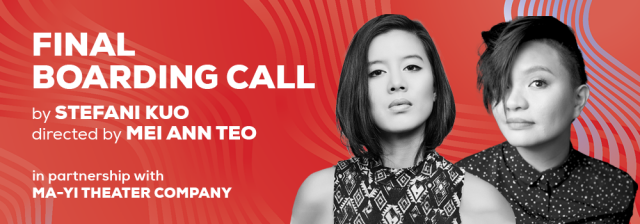
Who: WP Theater in partnership with Ma-Yi Theater Company
What: New streaming play
Where: WP Theater online
When: Select hourly streams March 10-14, free – $100
Why: WP Theater and Ma-Yi Theater Company have teamed up to present the world premiere of Stefani Kuo’s Final Boarding Call, streaming at specific times March 10-14. Directed by Mei Ann Teo (The Shape of a Bird, SKiNFoLK: An American Show) with multimedia design by Hao, the play is set during the Hong Kong protests, as seven characters face the crisis from different perspectives, affected in different ways. A New York–based playwright, poet, and performer, Kuo (Architecture of Rain, Bedlam’s King Lear) explores global capitalism, Chinese power, and people struggling to get by in tough, dangerous times. Admission is based on what you can afford; the play features unique use of Zoom boxes, animation, and green screens in telling its story.
WP Theater has been busy the last several months, streaming such other works as Cori Thomas’s Lockdown, Obehi Janice’s Ole White Sugah Daddy, Monica Bill Barnes & Company’s Keep Moving, and Rebecca Martínez’s The Nourish Project. Up next is a broadcast reading of MJ Kaufman’s Galatea in association with Red Bull Theater. Similarly, Ma-Yi and its new Ma-Yi Studios have been producing virtual works, including Ohnobu Pelican’s Clippy & Ms. U, which deals with the Fukushima disaster; Frederick Kennedy’s mesmerizing Rest, which repurposes seismic data in conjunction with quarantine recordings; and Ron Domingo’s short film Sophocles in Staten Island, about a family obsessed with Greek tragedy. Next is Daniel K. Isaac’s Once Upon a (korean) Time in April.
Update: I had expected Final Boarding Call to be a straightforward short trip, but it ended up being an emotionally turbulent and wholly satisfying two-hour nonstop flight. Written by Stefani Kuo and directed by Mei Ann Teo, the play tackles the 2019–20 Hong Kong protests, also known as the Anti-Extradition Law Amendment Bill movement, from multiple perspectives via seven characters, portrayed by actors over Zoom. Any public criticism of China is met with harsh retaliation, so some cast members don’t even use their full, real names in the credits, although facial recognition software makes that point moot.
Christina Ho (Sarah) is a flight attendant with a radical brother, Ting-Ting Ho, who is right in the middle of the protests at Hong Kong Polytechnic University. She works with Godfrey Kwok (Will Dao), a flight attendant who takes a liking to one of his passengers, Marc Olberg (Philip Cruise), a Tiffany’s executive with an advertising dilemma. Lucy Wang (M) is a freelance journalist attempting to interview a mysterious protest leader who goes by the screen name cocacola_chicken_wing; Lucy is about to have twins with her partner, Ravichandran Chopra (Rohan Kymal), but her estranged mother, Xiao Feng (Y.C.), wants her to return to mainland China despite the the suppression of dissent. As the various narrative threads come together and the characters debate just what freedom is, a small television monitor shows violent, frightening news footage of the protests. “I really admire the Hong Kong people for their . . . your spirit. It’s just — we can’t live in idealism, right?” Marc tells Godfrey.
Teo and designer Hao employ an impressive arsenal of Zoom stagecraft: They include text messages, use green-screen backgrounds to create the illusion that the well-developed characters are in the same rooms, display written-out stage directions, and utilize multiple, changing boxes to keep the action flowing, which prevents Final Boarding Call from becoming a standard virtual theatrical presentation with actors essentially buckled into their seats, tray tables in their upright position. Final Boarding Call concludes with a hard-hitting, powerful monologue by Sarah that makes the audience complicit in the fight for freedom everywhere, in Hong Kong and wherever else human beings are being held down, in the midst of resistance and rebellion. It’s an impressive landing to a play that isn’t afraid to pull any punches or wear its heart on its sleeve, symbolically taking the kinds of risks that freedom is all about.